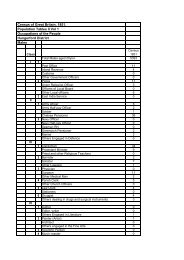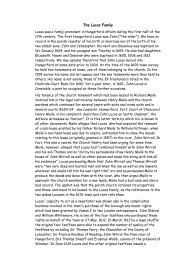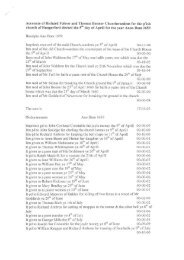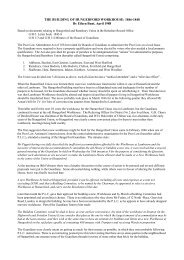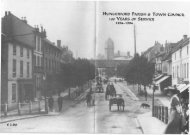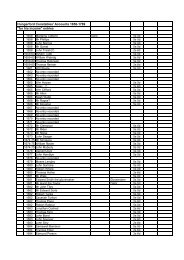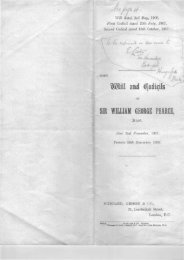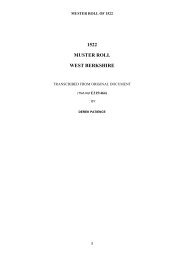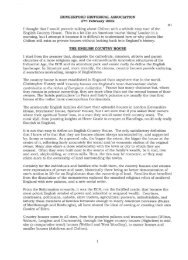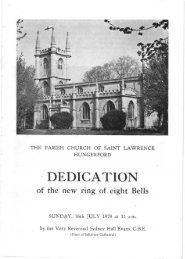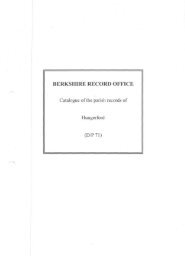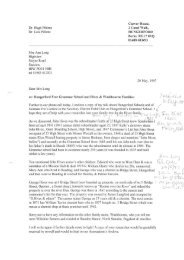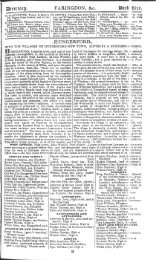Talk on British Legion by John Parry - Hungerford Virtual Museum
Talk on British Legion by John Parry - Hungerford Virtual Museum
Talk on British Legion by John Parry - Hungerford Virtual Museum
You also want an ePaper? Increase the reach of your titles
YUMPU automatically turns print PDFs into web optimized ePapers that Google loves.
90th Anniversary of the Royal <strong>British</strong> Legi<strong>on</strong><br />
It is a real pleasure to talk to fellow members of <strong>Hungerford</strong> Probus. My talk today is <strong>on</strong> the 90 th<br />
Anniversary, this m<strong>on</strong>th, of the Royal <strong>British</strong> Legi<strong>on</strong> and the 80 th Anniversary of the <strong>Hungerford</strong><br />
Royal <strong>British</strong> Legi<strong>on</strong> Branch. I will try and link Nati<strong>on</strong>al Developments in the Legi<strong>on</strong> with local<br />
developments in <strong>Hungerford</strong>.<br />
The RBL has many traditi<strong>on</strong>s <strong>on</strong>e of which is that at the beginning of a meeting the exhortati<strong>on</strong> is<br />
made. Before I start my talk I would like to ask Jack Williams, the President of <strong>Hungerford</strong> Royal<br />
<strong>British</strong> Legi<strong>on</strong> Branch to give the exhortati<strong>on</strong>. For those who are able to stand please do so. Jack<br />
please give the exhortati<strong>on</strong>. Thank you.<br />
The exhortati<strong>on</strong> is taken from a poem written <strong>by</strong> Laurence Biny<strong>on</strong> in the autumn of 1914. He was<br />
a n<strong>on</strong>-combatant and wrote the poem looking out to sea from a Cornish cliff. He is buried in the<br />
churchyard at Aldworth, Berkshire.<br />
At the same time tens of thousands of soldiers were volunteering for Kitcheners Army. One of<br />
these soldiers was a Private Frederick Lister from 11 th Battali<strong>on</strong> the East Lancashire Regiment. He<br />
was a volunteer with the Accringt<strong>on</strong> Pals who were to go over the top <strong>on</strong> the 1 st day of the Battle<br />
of the Somme <strong>on</strong> the 1 st July 1916. At the end of the day there were 585 casualties from a<br />
Battali<strong>on</strong> of 700 men. Private Lister was <strong>on</strong>e of the casualties. The Pals Battali<strong>on</strong>, as the name<br />
suggests, had been raised when groups of friends from coalmines, cott<strong>on</strong> mills, factory and office<br />
had answered the call to arms and joined Kitcheners Volunteer Army. A lot of these soldiers had<br />
grown up as str<strong>on</strong>g Trade Uni<strong>on</strong> members and Christians from the n<strong>on</strong>-c<strong>on</strong>formist traditi<strong>on</strong>.<br />
Private Lister was <strong>on</strong>e such man.<br />
Due to the wounds sustained <strong>on</strong> the Somme Private Lister was discharged and <strong>on</strong> returning home<br />
he saw that widows and children of his dead comrades had little or no financial support. Service<br />
organisati<strong>on</strong>s e.g. Army Benevolent Fund and what was to become Soldiers, Sailors and Airforce<br />
Associati<strong>on</strong> existed but they were unable to cope with the number of requests for assistance.<br />
Ex-Private Listers soluti<strong>on</strong> was to form the Federati<strong>on</strong> of Ex-Servicemen <strong>on</strong> Trade Uni<strong>on</strong> lines to<br />
fight for better c<strong>on</strong>diti<strong>on</strong>s. At least 3 other similar organisati<strong>on</strong>s were formed and eventually they<br />
came together after some heavy negotiati<strong>on</strong>s in May 1921 to form the <strong>British</strong> Legi<strong>on</strong>. The<br />
President was Field Marshal Haig and the Chairman was Frederick, later to be Sir Frederick Lister<br />
who was knighted for his service to the <strong>British</strong> Legi<strong>on</strong>.<br />
From the outset the aim of the <strong>British</strong> Legi<strong>on</strong> was to support the ex-service community and their<br />
families and also to provide an opportunity for ex-comrades to meet in a social setting. It was not<br />
and never has been a political organisati<strong>on</strong> associated with any political party.<br />
One of the Legi<strong>on</strong>s first tasks was to try and address the clear needs of the unemployed and<br />
disabled ex- servicemen and their families. They lobbied Parliament and Employers organisati<strong>on</strong>s
ut, for the purposes of this presentati<strong>on</strong> I would like to focus <strong>on</strong> the Legi<strong>on</strong>s role in becoming<br />
custodians of the traditi<strong>on</strong>s which we associate with Remembrance e.g.<br />
a) First Traditi<strong>on</strong> - The Silence<br />
The <strong>British</strong> Cabinet received a letter from a Sir Percy Fitzpatrick whose s<strong>on</strong> had been killed in<br />
France in 1917. Sir Percy suggested that a silence be observed <strong>on</strong> the anniversary of the ending of<br />
the war in memory of those who had died. The Cabinet agreed and it was decided to have a 2<br />
minutes silence <strong>on</strong> the 11 th hour of the 11 th day of the 11 th m<strong>on</strong>th. It was to be a complete<br />
suspensi<strong>on</strong> of all normal activities. The first of these 2 minutes silences was in November 1919.<br />
Main line trains stopped and the country came to a virtual standstill. Eventually the silence was<br />
moved to the nearest Sunday to the 11 th November and this is what we commemorate today. This<br />
November will be interesting in that it will be the 11 th hour of the 11 th day of the 11 th m<strong>on</strong>th of the<br />
11 th year.<br />
b) Sec<strong>on</strong>d Traditi<strong>on</strong> - Poppy Day<br />
This is the main way in which the Royal <strong>British</strong> Legi<strong>on</strong> raises funds it needs to support the exservicemen<br />
community. The idea to use the Poppy as a symbol came from a poem written <strong>by</strong><br />
Captain <strong>John</strong> McCrea, a Canadian Volunteer Regimental Medical Officer <strong>on</strong> the Western Fr<strong>on</strong>t.<br />
He died of wounds shortly after writing this:-<br />
“In Flanders Fields the Poppies blow between the croses row <strong>on</strong> row”<br />
On Armistice Day in 1921 there was the first Poppy Appeal. Poppies were made <strong>by</strong> limbless and<br />
disabled ex-servicemen in a <strong>British</strong> Legi<strong>on</strong> owned factory al<strong>on</strong>g the Old Kent Road in L<strong>on</strong>d<strong>on</strong>.<br />
This was to later move to the Star and Garter <strong>on</strong> Richm<strong>on</strong>d Hill and to the <strong>British</strong> Legi<strong>on</strong> village<br />
in Aylesford Kent. Last year the annual Poppy Appeal raised £35m nati<strong>on</strong>ally and £18.5k in<br />
<strong>Hungerford</strong><br />
c) Third Traditi<strong>on</strong> - Festival of Remembrance<br />
Annually <strong>on</strong> the Saturday before Remembrance Sunday there is a Festival of Remembrance at the<br />
Royal Albert Hall. This is a coming together of the <strong>British</strong> Legi<strong>on</strong> branches throughout the<br />
country in a multi-faith service of Remembrance. The Queen and senior members of the Royal<br />
Family, all <strong>British</strong> Legi<strong>on</strong> members, always attend. The 1 st Festival of Remembrance was held in<br />
1927 when the Womens Secti<strong>on</strong> of the Royal <strong>British</strong> Legi<strong>on</strong> paraded. The Womens Secti<strong>on</strong> had<br />
been formed in 1921 as an equal partner.<br />
In the inter war years there were huge challenges to the <strong>British</strong> Legi<strong>on</strong>. The General Strike of<br />
1926 saw large numbers of ex-servicemen <strong>on</strong> strike and <strong>British</strong> Legi<strong>on</strong> branches in the heavily<br />
industrial parts of our nati<strong>on</strong> operated soup kitchens to try and alleviate the distress of the strikers<br />
and their families. Something, incidentally, that was also d<strong>on</strong>e in the last Miners Strike in this<br />
country <strong>by</strong> <strong>British</strong> Legi<strong>on</strong> branches.
The rise of the <strong>British</strong> Uni<strong>on</strong> of Fascists under Sir Oswald Mosley was also a challenge to the<br />
<strong>British</strong> Legi<strong>on</strong>. The nati<strong>on</strong>al President of the <strong>British</strong> Legi<strong>on</strong>, Field Marshall Hamilt<strong>on</strong> of Gallipoli<br />
fame or notoriety depending <strong>on</strong> which book you readvisited Hitler in 1938 and stated “Hitler was<br />
for peace”. Some branches, e.g. Thatcham, invited Nazi ex-service organisati<strong>on</strong>s to England in an<br />
attempt to build bridges between ex-service groups, but nati<strong>on</strong>ally the <strong>British</strong> Legi<strong>on</strong> stood above<br />
party policies whilst their members exercised their democratic rights to engage in politics.<br />
But let us move <strong>on</strong>to the Royal <strong>British</strong> Legi<strong>on</strong> of today. The title Royal was awarded in 1971.<br />
Initially I would like to focus <strong>on</strong> <strong>Hungerford</strong> RBL Branch and Club. The Branch was formed in<br />
1931 and it met inpeople’shomes and in hotels. To my knowledge no records are available<br />
c<strong>on</strong>cerning these meetings but hopefully they may come to light. The catalyst for the Branch to<br />
become more active was ex-servicemen coming home to <strong>Hungerford</strong> after the Sec<strong>on</strong>d World War.<br />
A brief look at the plaques <strong>on</strong> the wall in the entrance hall will give some idea of the units and<br />
theatres of war where <strong>Hungerford</strong> servicemen and servicewomen fought e.g. D Day Associati<strong>on</strong>,<br />
Parachute Regiment, Royal Berkshire Regiment, Guards Brigade, various ships of the Royal<br />
Navy, Merchant Navy Bomber Command, Fighter Command, Womens Royal Army Corps,<br />
Burma Star, Far East Pris<strong>on</strong>ers of War etc.<br />
The Branch decided that they would establish a club at their AGM in May 1951 and a building<br />
fund was started. For the record the Committee was:-<br />
President Major Harvey (of Harveys Meadow fame)<br />
Secretary Mr T Abbott<br />
Treasurer Mr H Martin<br />
Chairman Mr Holmes<br />
Poppy Organiser Mr Audsley<br />
Standard Bearer Mr Chapman.<br />
As a character Mr Chapman must have been very interesting. His medals and a newspaper article<br />
about him are <strong>on</strong> the wall to the right as you go into the Bar. He served in the Boer War and<br />
received the following medals:-<br />
Queen Victoria South African Medal with 6 Campaign Clasps, 1914-15 Star (M<strong>on</strong>s Star), Victory<br />
Medal, <strong>British</strong> War Medal, Meritorious Service Medal. Unkindly known as 25 years undiscovered<br />
crime <strong>by</strong> an NCO.<br />
Mr Chapman must have been at least in his late 50s in 1939. He re-joined the Army <strong>by</strong> giving a<br />
false date of birth and served for some m<strong>on</strong>ths before he was discovered. He was put before a<br />
Court Martial, the Col<strong>on</strong>el of which asked him when he was awarded his Meritorious Service<br />
Medal. Mr Chapman replied that the Col<strong>on</strong>el had presented it to him in India where up<strong>on</strong> the<br />
Col<strong>on</strong>el tore up the charge sheet, dismissed Mr Chapman and told him to try his luck with another<br />
Regiment. A very interesting man and I would have loved to share a pint or three with him.<br />
I am very c<strong>on</strong>scious that I am relying <strong>on</strong> written records and there will be members of Probus who<br />
know first hand more about this than I do! Please accept my apologies for my errors in advance.
Funding for this Club House was raised in a variety of ways such as dances at the Corn Exchange<br />
and raffles. The main fund raising activity was to collect old newspapers to sell as there was a<br />
major shortage of newsprint. At least 2 evenings a week were given up collecting this paper. It<br />
was stored in old sheds in the Laundry yard next to the railway wall in what is now the area<br />
c<strong>on</strong>trolled <strong>by</strong> Tesco and the Tesco Car Park. As an aside the Laundry apparently had an 8.00am,<br />
1pm,2pm and 5pm whistle which was heard all over the Town with people setting their clocks <strong>by</strong><br />
the whistle.<br />
Whilst this fund raising was taking place the Committee was searching for a site. They selected a<br />
site next to the Railway Tavern, but the brewery opposed this. Obviously the thirst demands of ex<br />
soldiers, matelots and airmen were perceived to be too much competiti<strong>on</strong> for their Tavern. A Mr<br />
Sparkman’s shop adjoining Prospect Road was c<strong>on</strong>sidered but dismised as too smal. Eventualy<br />
they settled <strong>on</strong> this site which was adjacent to theold Regent cinema. The minutes state that “Mr<br />
Beardsley, the owner, had accepted the offer of the Branch i.e. £50 per year rent <strong>on</strong> a 21 year lease<br />
with an opti<strong>on</strong> of purchasing after 8 years. Eventually the land was purchased freehold for £250.<br />
Today this club has an insured value of over £1/2m!<br />
Plans were drawn up and tenders issued. All good local builders e.g. Morleys, Gibbs and<br />
Woolridge quoted and eventually a bid of £1887 was accepted in November 1955 <strong>by</strong> Morleys the<br />
builder. In June 1956 the new clubhouse was formally opened <strong>by</strong> General Sir Brian Horrocks of<br />
8 th Army fame who lived locally.<br />
Looking at the minutes we find so much of the work was d<strong>on</strong>e <strong>by</strong> volunteers from the Club.<br />
Lorries, tractors, diggers etc were loaned <strong>by</strong> builders. Legi<strong>on</strong> members who were tradesmen gave<br />
their time freely <strong>on</strong> volunteer days the end of which must have been interesting as the minutes<br />
refer to free beer for all those who have worked during the day.<br />
But whilst all this building was taking place to erect this current Clubhouse the Branch c<strong>on</strong>tinued<br />
its welfare work an example of which I quote from the Treasurers Receipt Book for 1956. 23<br />
households received bags of coal at a cost of £10 6s 11d from A Beard and S<strong>on</strong> for Christmas<br />
1956. It was noted that the coal merchant charged the coal at cost. I understand that the coal<br />
merchant was Jan Beard’s father. Hospital visits were made to Legi<strong>on</strong> members who were sick<br />
and gifts of packets of Woodbines and Senior Service cigarettes were given to them. Not really<br />
sure what Drs Lois and Hugh Philens would think about that today! But I am sure the cigarettes<br />
were most welcome. On the same page there was a d<strong>on</strong>ati<strong>on</strong> from a Mr C Williams to the <strong>British</strong><br />
Legi<strong>on</strong>. I think that was Jack’s Dad!<br />
But what is the role of the <strong>Hungerford</strong> RBL Branch today?<br />
First I must stress that the Branch is separate to the Club which is a limited company. The<br />
Branches sole functi<strong>on</strong> is to raise funds for the Legi<strong>on</strong> nati<strong>on</strong>ally and locally and to serve the exservice<br />
community in this area from a welfare point of view where the criteria is need not want.<br />
So what welfare work is d<strong>on</strong>e?
In the last year 13 members of the ex-service community in <strong>Hungerford</strong> and District have been<br />
assisted <strong>by</strong> the volunteer caseworker at the <strong>Hungerford</strong> Branch. I will give examples of the<br />
diversity of cases:-<br />
a) Assisting in obtaining EPVs or motorised scooters. Following a request <strong>by</strong> a member an<br />
assessment is made <strong>by</strong> their Doctor as to their suitability (thanks to Surgery) and a<br />
physiotherapist visits. A fully insured scooter is then issued and this is maintained <strong>by</strong> the<br />
Legi<strong>on</strong>.<br />
b) Help with paying funeral expenses. A widow living in a near<strong>by</strong> village did not have enough<br />
m<strong>on</strong>ey to bury her husband. He was an ex Royal Navy rating who served throughout the 2 nd<br />
World War in destroyers in the Atlantic, Mediterranean and Far East. <str<strong>on</strong>g>Talk</str<strong>on</strong>g>ing to the widow<br />
reminded me of <strong>John</strong> Manners excellent talk some m<strong>on</strong>ths ago. Following the visit and an<br />
assessment <strong>by</strong> the Royal Navy Associati<strong>on</strong> they met the balance of the funeral expenses and<br />
also granted her a Jellicoe Annuity. She now has a holiday for the first time in many years. She<br />
wrote to the Branch“Iwrite to thank the Legi<strong>on</strong> for assisting with the funeral expenses for my<br />
husband. I d<strong>on</strong>’t know what I would have d<strong>on</strong>e without the Legi<strong>on</strong>s help. I’m also grateful for<br />
the Navy to give me an Annuity every m<strong>on</strong>th”<br />
c) Another example was another ex Royal Navy man who had been a Leading Seaman in charge<br />
of a landing craft <strong>on</strong> D-Day. Certain events happened in his life which came to the attenti<strong>on</strong> of<br />
the Legi<strong>on</strong>. We arranged for him to have a respite holiday in West<strong>on</strong> Super Mare at a RBL<br />
Holiday Home known as Somerset House. We took him to West<strong>on</strong> and <strong>on</strong> being asked if he<br />
would like a sea view he said that he had seen enough of the sea during the War! He had a<br />
w<strong>on</strong>derful holiday and is a really lovely old gentleman<br />
d) The last example is outside of <strong>Hungerford</strong> but illustrates the Legi<strong>on</strong>s work nati<strong>on</strong>ally. I visited<br />
HMP Pris<strong>on</strong> Huntercombe to see an ex Grenadier Guardsman who is serving a 5 year stretch<br />
c/o Her Majesty. He wished to complete an educati<strong>on</strong>al course but did not have the £150 to<br />
pay for it. I approached the Grenadier Guards Associati<strong>on</strong> <strong>on</strong> his behalf and they have paid for<br />
the course. Hopefully this will assist this gentleman when he is released from Pris<strong>on</strong>.<br />
The role of the volunteer caseworker is to either alm<strong>on</strong>ise with the Regimental Associati<strong>on</strong>, like<br />
the Grenadier Guards, Royal Air Force Benevolent Fund or the Royal Navy Associati<strong>on</strong> or to act<br />
as an informati<strong>on</strong> gatherer for the <strong>British</strong> Legi<strong>on</strong> and send the completed informati<strong>on</strong> to the<br />
Legi<strong>on</strong> in Reading who then act <strong>on</strong> it.<br />
Pers<strong>on</strong>ally I find the role of being a volunteer caseworker to be the most rewarding aspect of<br />
being a member of the <strong>Hungerford</strong> RBL Branch and it is in some ways very humbling to visit 2 nd<br />
WW veterans who sometimes are too proud to apply for and accept state benefits which are their<br />
entitlement.<br />
A sec<strong>on</strong>d major role of the <strong>Hungerford</strong> Branch is to raise m<strong>on</strong>ey for the Poppy Appeal. I’ve<br />
already menti<strong>on</strong>ed that last year a small town like <strong>Hungerford</strong> raise over £18.5k from a populati<strong>on</strong><br />
of about 5,000 people. The very able, and may I say beautiful, Poppy co-ordinator leads a team of<br />
40 volunteers who raised that m<strong>on</strong>ey over a 2 week period.
A third role that I would like to menti<strong>on</strong> is that the standard of the <strong>Hungerford</strong> Branch of the RBL<br />
has been represented at most if not all of the repatriati<strong>on</strong>s of deceased servicemen whose bodies<br />
have been returned to this country via Royal Woot<strong>on</strong> Basset from Afghanistan.<br />
But what of the RBLs work nati<strong>on</strong>ally?<br />
It is the largest and leading serving and ex service organisati<strong>on</strong> and <strong>on</strong>e of the UKs best known<br />
and highly respected charities.<br />
The stated intenti<strong>on</strong> is that no serving or ex-service pers<strong>on</strong> or their family should be without a<br />
place to turn to when in need. There are nearly 10m people in the UK eligible for support if in<br />
need. Recently the RBL has:-<br />
In the last year resp<strong>on</strong>ded to 160,000 welfare requests<br />
Is investing with the Ministry of Defence £25m for Pers<strong>on</strong>nel Recovery Centres which will<br />
provide residential accommodati<strong>on</strong> for service pers<strong>on</strong>nel undergoing recovery after<br />
suffering horrendous injuries in either Iraq or Afghanistan.<br />
Is arguing str<strong>on</strong>gly for a Covenant with the Government of the day where<strong>by</strong> service men<br />
and servicewomen have rights and obligati<strong>on</strong>s which the Government, in law, would be<br />
forced to take into account. These negotiati<strong>on</strong>s appear to be progressing well, but with<br />
Governments of all colours you never know.<br />
So the Royal <strong>British</strong> Legi<strong>on</strong> is 90 years old this m<strong>on</strong>th. In my view it is in a very str<strong>on</strong>g positi<strong>on</strong><br />
but like all charities needs the financial support from the public through the Poppy Appeal and<br />
volunteers to carry out the increasing welfare casework. It is an <strong>on</strong>-going task especially with<br />
maintaining and increasing membership.<br />
Before I c<strong>on</strong>clude I would like to ask Alan Smith a Royal <strong>British</strong> Legi<strong>on</strong> member who has held<br />
the post of H<strong>on</strong>orary County Treasurer and Branch Chairman in East Anglia to give the Kohima<br />
Epitaph. Please remain seated.<br />
“When you go home tel them of us and say for your tomorow we gave our today”<br />
Thank you Alan<br />
In my view this statement, written <strong>on</strong> the <strong>British</strong> Armies 2 nd Divisi<strong>on</strong> Memorial <strong>on</strong> the<br />
Burma/India border sums up the role of the Royal <strong>British</strong> Legi<strong>on</strong> in supporting members of our<br />
Armed forces and their families.<br />
Thank you for listening.



